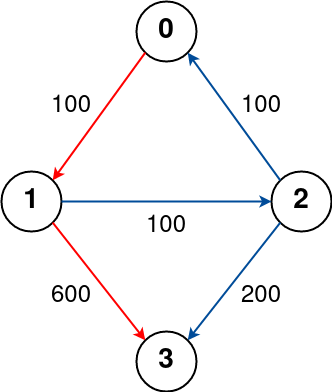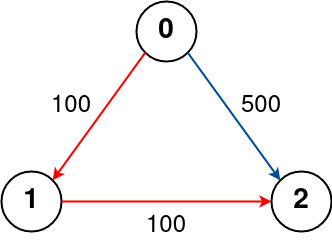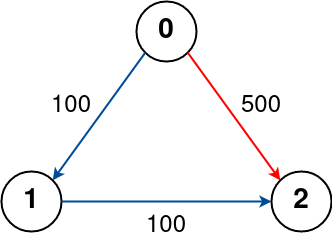787. Cheapest Flights Within K Stops

,%20Shortest%20Path-orange.svg)
Description
There are n cities connected by some number of flights. You are given an array flights where flights[i] = [fromi, toi, pricei] indicates that there is a flight from city fromi to city toi with cost pricei.
You are also given three integers src, dst, and k, return the cheapest price from src to dst with at most k stops. If there is no such route, return -1.
Example 1:

Input: n = 4, flights = [[0,1,100],[1,2,100],[2,0,100],[1,3,600],[2,3,200]], src = 0, dst = 3, k = 1 Output: 700 Explanation: The graph is shown above. The optimal path with at most 1 stop from city 0 to 3 is marked in red and has cost 100 + 600 = 700. Note that the path through cities [0,1,2,3] is cheaper but is invalid because it uses 2 stops.
Example 2:

Input: n = 3, flights = [[0,1,100],[1,2,100],[0,2,500]], src = 0, dst = 2, k = 1 Output: 200 Explanation: The graph is shown above. The optimal path with at most 1 stop from city 0 to 2 is marked in red and has cost 100 + 100 = 200.
Example 3:

Input: n = 3, flights = [[0,1,100],[1,2,100],[0,2,500]], src = 0, dst = 2, k = 0 Output: 500 Explanation: The graph is shown above. The optimal path with no stops from city 0 to 2 is marked in red and has cost 500.
Constraints:
1 <= n <= 1000 <= flights.length <= (n * (n - 1) / 2)flights[i].length == 30 <= fromi, toi < nfromi != toi1 <= pricei <= 104- There will not be any multiple flights between two cities.
0 <= src, dst, k < nsrc != dst
Solution
cheapest-flights-within-k-stops.py
class Solution:
def findCheapestPrice(self, n: int, flights: List[List[int]], src: int, dst: int, k: int) -> int:
pq = [(0, src, k + 1)]
graph = defaultdict(list)
seen = {}
for a, b, price in flights:
graph[a].append((b, price))
while pq:
weight, node, stops = heappop(pq)
if node == dst: return weight
if node in seen and seen[node] >= stops: continue
seen[node] = stops
if stops > 0:
for adj, adjW in graph[node]:
heappush(pq, (weight + adjW, adj, stops - 1))
return -1
cheapest-flights-within-k-stops.java
class Solution {
public int findCheapestPrice(int n, int[][] flights, int src, int dst, int K) {
// Build the adjacency matrix
int adjMatrix[][] = new int[n][n];
for (int[] flight: flights) {
adjMatrix[flight[0]][flight[1]] = flight[2];
}
// Shortest distances array
int[] distances = new int[n];
// Shortest steps array
int[] currentStops = new int[n];
Arrays.fill(distances, Integer.MAX_VALUE);
Arrays.fill(currentStops, Integer.MAX_VALUE);
distances[src] = 0;
currentStops[src] = 0;
// The priority queue would contain (node, cost, stops)
PriorityQueue<int[]> minHeap = new PriorityQueue<int[]>((a, b) -> a[1] - b[1]);
minHeap.offer(new int[]{src, 0, 0});
while (!minHeap.isEmpty()) {
int[] info = minHeap.poll();
int node = info[0], stops = info[2], cost = info[1];
// If destination is reached, return the cost to get here
if (node == dst) {
return cost;
}
// If there are no more steps left, continue
if (stops == K + 1) {
continue;
}
// Examine and relax all neighboring edges if possible
for (int nei = 0; nei < n; nei++) {
if (adjMatrix[node][nei] > 0) {
int dU = cost, dV = distances[nei], wUV = adjMatrix[node][nei];
// Better cost?
if (dU + wUV < dV) {
minHeap.offer(new int[]{nei, dU + wUV, stops + 1});
distances[nei] = dU + wUV;
}
else if (stops < currentStops[nei]) {
minHeap.offer(new int[]{nei, dU + wUV, stops + 1});
}
currentStops[nei] = stops;
}
}
}
return distances[dst] == Integer.MAX_VALUE? -1 : distances[dst];
}
}